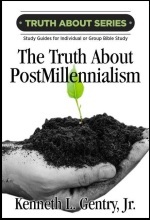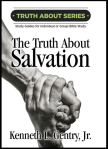OUR INTERMEDIATE EXISTENCE
 PMW 2025-030 by Michael Allen
PMW 2025-030 by Michael Allen
Gentry note:
The following few paragraphs are taken from Michael Allen’s chapter in Zondervan’s Four Views on Heaven (p. 130–32). While I don’t agree with every detail of his statement, I have found it very helpful and elucidating. The editor gave a list of questions that each contributor was to answer. This is Allen’s paragraphs given to answering the question. The book is available at Amazon.com
Michael Allen, “A Heaven on Earth Perspective”
5. How does your view of our end relate to the intermediate state? How is it similar and how is it different?
Many push against the idea of an intermediate state. It is hard to grasp the motivating impulses for such a shift apart from a judgment that the material is essential. Note that this is not a simple claim that the material is optimal or original or even normative but that the material is essential and-even more pointedly-essential in every moment. Therefore, a human being whose body has expired and who has not yet been physically raised from the dead cannot exist in any intervening state. Exponents may speak of this as a nonreductive physicalism, but it is surely a variant of physicalism. The argument is premised on the idea that human existence is physical and therefore cannot be anything but physical. At the same time, there is a claim that the Bible in no way speaks of a disembodied human existence.
The Truth about Postmillennialism By Ken Gentry
By Ken Gentry
A group Bible study guide for explaining the optimistic prophetic hope for this world to be accomplished before Christ’s Second Coming. Establishes the postmillennial system in both the Old and New Testaments. Touches on key eschatological issues, such as creation, covenant, interpretive methodolgy, the great tribulation, the Book of Revelation, the Jewish Temple, and more. It presents and answers the leading objections to postmillennialism.Twelve chapters are ideal for one quarter of Sunday School.
See more study materials at: www.KennethGentry.com
Nonreductive physicalism goes further and denies not only a soul- ish intermediate state but the very concept of a distinct soul in human constitution, period. Nonreductive physicalists read the diverse terms body, soul, and spirit to refer aspectively, rather than partitively, to a human being. James D. G. Dunn describes the difference:
“In simplified terms, while Greek thought tended to regard the human being as made up of distinct parts, Hebraic thought saw the human being more as a whole person existing on different dimensions. As we might say, it was more characteristically Greek to conceive of the human person ‘partitively,’ whereas it was more characteristically ‘Hebrew’ to conceive of the human person ‘aspectively.’ That is to say, we speak of a school having a gym (the gym is part of the school); but we say I am a Scot (my Scottishness is an aspect of my whole being).”
Nonreductive physicalism asserts the human being on earth is wholly physical, and there is nothing that can then transverse the experience of death and enjoy a future phase of divine paradise apart from bodily life. The biblical evidence gestures otherwise, however. I leave to the side here the broader question of body-soul dualism and focus more on the question of an intermediate state. While the New specifically Testament does not riff widely or in detail on the nature of an intermediate state, it does pressure us to affirm that such a state exists in some fashion and with at least some definition. See how Christ responded to one of the thieves executed with him on Golgotha (as described in Luke 23:39–43). One criminal mockingly pressed Jesus to save them. The other criminal rebuked the first and affirmed the innocence of Jesus. Turning to Jesus, he implored: “Jesus, remember me when you come into your kingdom.” Jesus replied, “Truly I say to you, today you will be with me in paradise” (Luke 23:42–43).
 The Truth about Salvation By Ken Gentry
The Truth about Salvation By Ken Gentry
A study guide for personal or small group Bible study. Deals with the Christian doctrine of salvation from a Reformed theological perspective. It opens with a study of God as loving Creator, the shows how the first man fell into sin. Shows God’s righteousness requires that sin be dealt with. Presents Jesus as both God and man so that he can be man’s Savior. Includes review questions and questions for further study.Twelve chapters are ideal for one quarter of Sunday School.
See more study materials at: www.KennethGentry.com
The intermediate state is not the final state. It is a good gift and can be called “paradise,” yet it is not perfection. Why say it is imperfect? It is sinless and good, but it is not yet the complete or total culmination of all things; perfection here would mean wholistic completion or final attainment of the world’s full and fitting end. The intermediate state is immaculate, yet it has not attained that final intended reality. The conclusion to Hebrews 11 addresses the fate of Old Testament believers, all of whom had died prior to the writing of that epistle. “These were all commended for their faith, yet none of them received what had been promised, since God had planned something better for us so that only together with us would they be made perfect” (Heb 11:39–40). These saints were commended, but they had not yet received the promise or been “made perfect” (a term that connotes not sinlessness but maturity or completion; see also Heb 5:14). Perfection or wholeness only comes when all the redeemed experience it together; the words “together with are crucial in this regard. So, the intermediate state is good and even Paradise, but it is not the best and final state.
The Bible commends some notion of an intermediate state, which involves discontinuity and continuity with respect to our final destiny. There is an elemental continuity in that the spiritual presence of Almighty God, as well as the communion of the saints, may be enjoyed. And yet not yet that interpersonal fellowship exists in a wholly spiritual state that is resurrected or environmentally situated in a new heaven and new earth We can define the intermediate state only in very broad strokes. It involves the enjoyment of God’s presence, occurs in a temporarily disembodied state, is paradisal in character (as opposed to purgatorial in mood), and is not yet the climactic finale of redemptive history.
[image error]Why I Left Full-Preterism (by Samuel M. Frost)
Former leader in Full Preterist movement, Samuel M. Frost, gives his testimony and theological reasoning as to why he left the heretical movement. Good warning to others tempted to leave orthodox Christianity.
See more study materials at: KennethGentry.com
We should return to the challenge of nonreductive physicalism and its psychosomatic approach to human identity. The apostolic portrayal of the intermediate state in no way limits us from affirming that psychosomatic wholeness marks the perfection or completeness of human identity. Hebrews 11 suggests that no saint receives the promise or perfection until they do so with all the redeemed (in their resurrection state upon the return of Christ). The resurrected and glorified body in the new heavens and new earth remains the consummation of our Christian hope, though neither embodiment nor environmental location is the most significant marker of that glory. God’s presence is the prime and central thread in human happiness, and it will be most fully experienced when framed by bodily, indestructible life and by a restored, earthly context.
Gentry concluding note:
To read his full presentation including footnotes, consult the book Four Views on Heaven.
Click on the following images for more information on these studies:



Kenneth L. Gentry Jr.'s Blog
- Kenneth L. Gentry Jr.'s profile
- 85 followers



